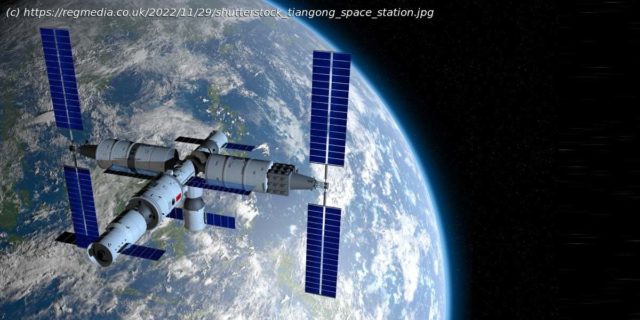PLUS: ChatGPT hallucinates Japan’s PM; Infosys scores huge BP deal; Grab on the way to becoming a bank; and more
The China Manned Space Agency (CMSE) last week put out a call for low-cost cargo haulage services to its space station.
The announcement said Beijing wants cheap transportation to Tiangong to foster commercial space activity and enhance the space station’s activities.
The deadline for applications is July 15, so there’s not much time left to sketch out the required spacecraft, launch vehicles and launch support.
According to an accompanying technical guide, Beijing has set the price it’s willing to pay at $17.1 million per metric ton of cargo.
That’s far less than the commercial services used by NASA to service the International Space Station: SpaceX’s resupply missions between 2012 and 2017, for example, carried an average 2,200kg at $152 million per launch – about $69 million per metric ton. SpaceX also offers launches at $5,500 per kg ($5.5 million per ton), for payloads on shared missions.
China wants private providers to dock with Tiangong and stay in place for at least three months. CMSE is unfussed about what happens to the vehicle after it delivers to Tiangong.
AI advocate and Japanese minister of digital affairs, Taro Kono, said he’s been misidentified by ChatGPT as the country’s prime minister.
“I asked ChatGPT who Kono Taro is and he came back with the wrong answer,” Kono told Bloomberg Television last week.
“So you need to be careful,” he warned.
Kono has led the charge to bring Japan – where floppy disks have only recently been banned – into the modern digital era. While the tech minister has polled well as a candidate for PM, he does not hold the role.
The current prime minister of Japan is Fumio Kishida.
Asia’s top ride-hailing service Grab reported on Thursday that its financial services revenue for the quarter grew 233 percent year on year to $38 million from $11 million.
In September 2022, the superapp told investors that it pre-approves personal loans to drivers, and 30 percent of drivers have an active loan.
Grab, in partnership with telecom Singtel, also promised investors it will launch its Digibank service in six months. CFO Peter Oey said the biz has a “very clear target” to break even over the next three years for the segment. Digibanks are completely online operated bank entities – providing accounts, deposits and debit and credit cards.
The Grab-Singtel consortium received the green light to open its Digibank from the Monetary Authority of Singapore (MAS) in December 2020.
Oey also detailed that Grab was “in the early days of exploring AI productivity tools,” which it believes will “have the potential to unlock further efficiencies and reduce costs in our business over time.”
COO Alex Hungate said that “One of the key sources of uncertainty in the region over many years has been the regulation around the gig economy as it has been in other regions.






